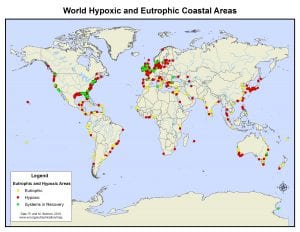Faculty Cluster Pursues Coastal Sustainability
 Coastal systems research will soon evolve beyond its typical limits by integrating an interdisciplinary focus in a new collective opportunity. To no surprise, coastal systems research is vital to the state of Florida, given that its well-being maintains the economy and environment.
Coastal systems research will soon evolve beyond its typical limits by integrating an interdisciplinary focus in a new collective opportunity. To no surprise, coastal systems research is vital to the state of Florida, given that its well-being maintains the economy and environment.
The University of Central Florida’s faculty has recognized these stresses and has taken the responsibility to become a leading scientific voice regarding the anthropogenic and environmental pressures developing on its own coast through the Faculty Cluster Initiative.
Known as the Sustainable Coastal Systems Faculty Cluster, this joint initiative mirrors Sustainability Initiatives’ mission in partnering efforts in pursuit of sustainability as opposed to working apart.
The Sustainable Coastal Systems Cluster will be one of the first in the nation to incorporate an interdisciplinary approach to ocean and coastal research by pairing current faculty members with new hires. It will bring together biologists, chemists, and engineers with anthropologists, sociologists, political scientists, planners, emergency managers, and economists.
This broad-based research and development cluster will integrate science and social needs to address coastal issues and train students in conservation and resource management.
 Biology professor and Sustainable Coastal Systems Cluster Lead, Graham Worthy, Ph.D., defines what constitutes a “sustainable coastal system” to provide an idea of the cluster’s goals: “We view it as one in which we can balance the development that is inevitable while ensuring the continuance of Florida’s coastal/ocean resources and economy for future generations.”
Biology professor and Sustainable Coastal Systems Cluster Lead, Graham Worthy, Ph.D., defines what constitutes a “sustainable coastal system” to provide an idea of the cluster’s goals: “We view it as one in which we can balance the development that is inevitable while ensuring the continuance of Florida’s coastal/ocean resources and economy for future generations.”
Dr. Worthy is optimistic in the cluster and his leadership thereof. “Its sounds hokey but I felt like I had the capacity to pull a very disparate group of folks together and hopefully create something that will not only last a long time into the future but truly make a difference.”
The solutions, methodologies and technologies developed at UCF will have immediate application to other geographic locations. The cluster and its efforts have potential to be statewide and national models for how coastal states should address future environmental and economic challenges and growth opportunities.
View original story here.
For more information, visit http://www.ucf.edu/faculty/cluster/sustainable-coastal-systems/.
